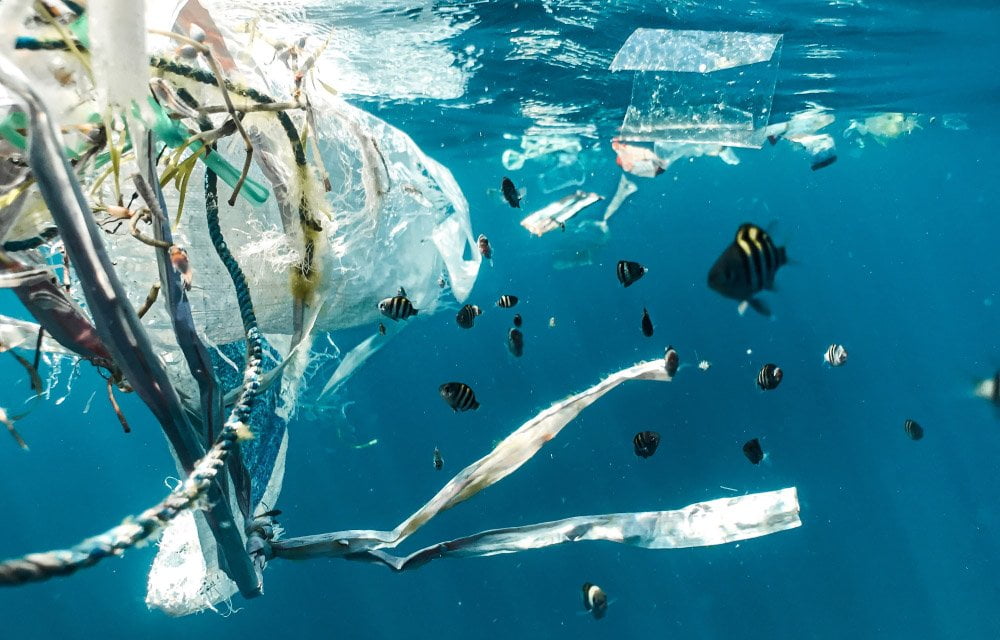The chilling reality of our internet usage and online habits
The internet has changed our digital and everyday life - at a significant price to the environment
The entire internet (web servers, data centres, end-user devices, backbone infrastructure, etc.) consumes energy and thus emits greenhouse gases, as well as air and water pollution.
One must also consider the e-waste and toxic pollution caused by the production and disposal of electronic devices used to interface with the internet, such as computers and smartphones. The construction of data centres and other infrastructure for the internet can also lead to deforestation, soil degradation, and water scarcity.
In addition, the transportation of goods and services related to the internet, such as shipping of products bought online, contribute to air and carbon emissions.
To mitigate the environmental impact of the internet, it is important to adopt more sustainable practices
To most people, the internet is a virtual world with limitless storage and delivers information, connectivity and functionality with no machinery and with no environmental impact. However, the internet is powered by a vast network of energy-hungry infrastructures, data centres, networks and devices that store and transfer massive amounts of data.
As the Internet grows exponentially and as content has evolved into multimedia including audio and video, so does the need for more and more servers in data centres. These servers need to run in cooled, controlled environments, so they require a large amount of energy and have a significant carbon dioxide output.
This requires a tremendous amount of electricity 24/7, causing as much pollution as the airline industry. If the internet was a country, it would be the world's 6th largest polluter!
Adopting sustainable practices (such as using renewable energy, implementing energy-efficient technologies and reducing e-waste) is vital to mitigating the environmental impact of the internet, .
Covid-19 lockdowns, remote work, virtual meetings and the world’s carbon footprint
According to research, due to the Covid-19 lockdowns remote work and virtual meetings could increase the world's carbon footprint by 34.3 million tons from greenhouse gases. This increase in emissions will require a forest twice the size of Portugal to fully absorb it.*
* Source How to reduce the environmental impact of your next virtual meeting: MIT News

Green web hosting reduces your carbon footprint, improves your brand image and supports clean energy while contributing to a more sustainable future
Green web hosting prioritises sustainability and environmental responsibility
With the exponential growth of the internet, the energy consumption and carbon footprint of web hosting has become a major contributor towards the problem. Most web host providers rely on non-renewable energy sources - which contributes to greenhouse gas emissions and pollution.
By choosing green web hosting, you can help reduce the environmental impact of the internet. Green web hosting providers use renewable energy and energy-efficient technologies to reduce their carbon footprint. They also offset their carbon emissions to neutralise their remaining emissions and to further help mitigate the effects of climate change.
Green web hosting provides many benefits for businesses and organisations
In addition to being environmentally friendly, green web hosting has many benefits for businesses and organizations. It can improve your brand image and customer trust by demonstrating your commitment to sustainability and ethical business practices. It can also save you money by reducing your energy costs and improving the efficiency of your hosting infrastructure. Furthermore, by supporting green web hosting, you are supporting the growth of clean energy and helping to create a more sustainable future for everyone.
Overall, green web hosting is an important step towards a more sustainable and responsible internet. By choosing green web hosting, you can help reduce the environmental impact of the internet and make a positive difference in the world.
The alarming environmental impact of our connected internet world
Most people cannot conceive of their impact on climate change through their internet usage
Most people, even those who are conscious of their environmental footprint, cannot conceive of their impact on climate change through their internet usage - whether that be as a consumer of internet usage or as an owner of just an average website. So, to put this into perspective, here are some disconcerting statistics of the internet's environmental impact:
- Internet pollution accounts for 4% of global greenhouse emissions
- The internet generates about one billion tons of greenhouse gasses a year
- This digital pollution generated by the internet is expected to double by 2025
- Many countries have already reported at least a 20% increase in internet traffic since COVID
- Just twenty emails a day over a single year creates the CO2 emissions of a car travelling 1000 km
- The average website annually produces carbon equivalent to driving an average new car for more than 16,000 kilometers
- By browsing the web, an average internet user yearly requires 2,900 litres of water, corresponding to the CO2 emitted when traveling 1,400 km by car
- One hour of video-conferencing or streaming emits 150-1,000 grams of carbon dioxide, requires 2-12 liters of water and demands a land area up to the size of an iPad Mini
Why people do not see their internet usage as harmful to the environment
It is difficult for people to see the environmental impact of their internet usage when they are focused on the benefits
There are a number of reasons why people do not see the harmfulness of their internet usage to the environment:
- Lack of awareness
The internet has become so integral to our lives, people no longer consider the environmental impact of their usage. Many people may not be aware of the energy consumption and associated emissions associated with internet use. This can make it difficult for them to see the connection between their internet usage and the environment. - Disconnection from consequence
The internet is a virtual space, and people often feel disconnected from the physical infrastructure and resources required to power it. This makes it difficult for people to appreciate the environmental impact of their internet usage. - Perceived convenience
The internet provides people with convenient access to information and communication, which can make it difficult for people to prioritise environmental considerations over their personal convenience. - Disproportionate responsibility
Many people believe that their own internet usage is negligible in terms of environmental impact and, as such, they are only accountable for their small contribution towards the problem. - Technological progress
It is difficult for people to keep up with the impact that new technologies and services have on the environment.

How can I help reduce my internet environmental impact?
If you have a website, support green hosting because it improves your brand image
Consider using a web hosting provider that uses renewable energy and has a commitment to sustainability.
By doing so, you already help the environment just by choosing to use a green web hosting company, without lifting a finger. Green web hosting companies have infrastructure that is 100% carbon neutral and offset the energy used by your website, making your website carbon neutral or even carbon negative!
Green web hosting companies make a conscious effort to care for our planet. Serversaurus achieves this through continuously optimising our infrastructure and partnering with Greenfleet to offset all our emissions, becoming a Certified B Corporation. and donating 1% for the Planet.
Optimise your website because a lean website not only reduces your website’s environmental footprint, it can benefit your business too
Energy is required to transfer all data (images, videos, text, files) whenever a website page loads from the server to your browser. The average website produces carbon equivalent to driving an average new car for more than 16,000 kilometers. So, by optimising the efficiency of your website helps to reduce the amount of energy needed to power your site.
Having a lean, green website not only reduces your website's environmental footprint, it can benefit your business in three other ways:
- Improved user experience
People expect your website to be fast, especially on mobile devices. Visitors will "bounce" (leave your site) after just a few seconds if a page takes too long to load. - Better Search Engine Optimisation (SEO)
Page speed affects SEO, simply because Google doesn't like to rank sites which provide a bad user experience. Page speed is so important to the user experience that Google included it as one of its ranking factors in 2018. A low page speed could allow another site - maybe even a competitor's website - to get better search engine results. People expect your website to be fast, especially on mobile devices. Visitors will "bounce" (leave your site) after just a few seconds if a page takes too long to load. - Higher conversion rates
Conversion rates are when visitors take a desired action, like clicking a button or purchasing a product. The conversion rate is simply the percentage of total visitors to a web page who convert. Studies have shown that faster page speeds result in a higher conversion rates. For example, Walmart found that for every 1 second improvement in page load time, conversions increased by 2% - and Amazon found that every 100ms in added page load time cost them 1% in sales.
Turn off your camera during virtual meetings
The COVID pandemic-driven shift to remote work has presented a significant environmental impact due to the footprint of video-conferencing on carbon emissions, water usage and land requirements.
Just one hour of video-conferencing emits 150-1,000 grams of carbon dioxide, requires 2-12 liters of water and requires a land area the size of an iPad Mini.
By simply leaving your camera off during virtual meetings can reduce your footprint during that period by 96%. And by streaming your video-conference in standard format, rather than in high definition, could in itself result in a 86% reduction in your footprint during the meeting.
Download instead of stream
Streaming music and videos contribute to your digital carbon footprint. Rather than continuously streaming your music and videos, opt into downloading whenever possible. This means you'll download the data from the server only once and play remotely it, whenever required.
Optimise storage of files and documents
Most people think their data stored in the cloud has no environmental impact. But each 100 gigabytes of data in the cloud per year results in a carbon footprint of about 0.2 tons of CO2. So, delete any unnecessary data stored in the cloud. And by that we mean delete anything you can access elsewhere but do not require.
Reduce your social media scrolling!
Social media apps like Facebook and Instagram contribute to carbon emissions more than we realise. Every minute of scrolling on a newsfeed is roughly the equivalent of driving an average car 13 metres. So when you consider that the average time spent on Instagram is 53 minutes per day, that equates to driving a car 689 metres! So, by doing something like going for a walk instead of social media scrolling not only helps our planet - it helps your body too.
Educate others
Spread the word about the environmental impact of the internet and encourage others to take actions to reduce their carbon footprint.
Reduce your screen time
By reducing your screen time you minimize the amount of time you spend using the internet which reduces your carbon footprint.

Collective action through personal changes in internet habits paves the way for a sustainable future
Each and every one of us has the power to play a role in reducing the carbon footprint of our internet usage and contributing to a more sustainable future
The ability for each of us to reduce our internet usage reflects the responsibility that individuals have to create a more environmentally friendly digital environment.
By making small changes to our own internet usage, together we can make a big impact and help ensure a sustainable future for generations to come. We all know there are lots of things we can do to help reduce air pollution, such as using public transport instead of cars – or ride sharing rather than using our own car. We know how to reduce our environmental footprint by recycling glass bottles and jars, metal and aluminum cans and plastic bottles. And by composting fruit and vegetable waste, it reduces the amount of trash buried in landfills.
If you have a website, email or any other cloud applications, the best place to start is choosing a green host, like Serversaurus.
We can also all do our part to reduce the environmental impact of our internet usage by simply changing our habits and being constantly aware of the environmental impact of the internet and how it contributes towards climate change.
Last updated November 30, 2023